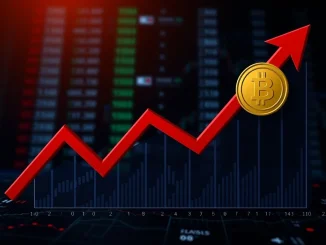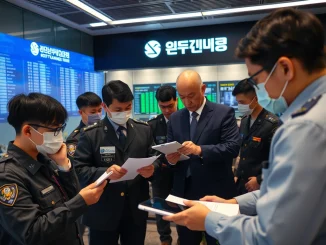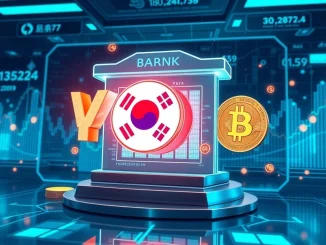
The world of digital assets is constantly evolving, and clear regulatory frameworks are essential for growth and investor protection. For participants in the Korean crypto market, a significant development is on the horizon. A new legislative proposal in South Korea aims to bring much-needed structure and clarity to the industry, potentially setting a benchmark for future digital asset governance.
South Korea Digital Asset Bill on the Horizon
A key legislative move is underway in South Korea that could redefine the landscape for cryptocurrencies and other digital assets. Min Byoung-dug, a prominent lawmaker from the Democratic Party of Korea (DPK), is set to introduce a significant piece of legislation on June 10th. This bill, referred to as the Digital Asset Basic Act, has been anticipated by industry stakeholders and market participants alike.
The core objective of this proposed legislation is ambitious: to establish a comprehensive and clear regulatory framework for South Korea’s burgeoning digital asset industry. This isn’t just about imposing rules; it’s about creating a predictable environment where innovation can thrive alongside robust consumer protection measures.
What Does the Digital Asset Basic Act Propose?
Based on initial reviews, the proposed Digital Asset Basic Act outlines several key pillars designed to govern the industry. These proposals cover various aspects, from oversight bodies to specific market practices and asset types. Here’s a look at some of the critical components:
- Presidential Committee on Digital Assets: The bill proposes the establishment of a dedicated committee operating under the President. This body would likely be tasked with overseeing policy direction, coordinating regulatory efforts across different agencies, and adapting rules as the market evolves.
- Mandatory Compliance Rules: Digital asset service providers (DASPs) operating in South Korea would face mandatory compliance requirements. This could include stringent Know Your Customer (KYC) and Anti-Money Laundering (AML) protocols, operational standards, and reporting obligations.
- Licensing System for Token Issuers: A significant step towards formalizing the market is the proposal for a licensing system for entities that issue tokens. This could involve rigorous checks on the issuer’s business plan, financial stability, and tokenomics, aiming to prevent fraudulent or poorly conceived projects from reaching investors.
- Ban on Unfair Trading Practices: To ensure market integrity, the bill specifically targets unfair trading activities. Practices like market manipulation, insider trading, and wash trading would be explicitly banned, with clear penalties outlined for violations. This is crucial for building trust in the Korean crypto market.
- Stablecoin Requirements: Given the growing importance and potential risks of stablecoins, the bill includes specific requirements for their issuers. These include obtaining approval from the Financial Services Commission (FSC), South Korea’s primary financial regulator, and maintaining a minimum capital requirement, reportedly set at 500 million won (approximately $369,400 USD).
- Self-Regulatory Body: The bill also calls for the creation of a self-regulatory organization (SRO). This body, potentially comprising industry participants, would be responsible for overseeing critical aspects like token listings, delistings, and ensuring ongoing compliance among members. An SRO can often respond more quickly to market changes than government bodies.
Why is Clear Crypto Regulation South Korea Important?
The move to introduce a comprehensive South Korea digital asset bill reflects a growing recognition of the need for clear rules in a rapidly expanding sector. Without clear regulation, the market can be prone to scams, volatility, and a lack of investor confidence. A well-defined framework can offer several benefits:
- Investor Protection: Clear rules on licensing, compliance, and unfair practices directly benefit retail and institutional investors by reducing risks.
- Market Stability and Growth: Regulatory certainty can attract more institutional investment and foster sustainable growth within the Korean crypto market.
- Innovation with Guardrails: A framework allows legitimate businesses to innovate while preventing illicit activities.
- International Harmonization: Developing a clear South Korea crypto law can help align the country’s digital asset sector with international standards and practices.
While the details will become clearer upon the bill’s official introduction and subsequent legislative process, this proposal signals a serious commitment from South Korean lawmakers to address the complexities of the digital asset space head-on. The DPK’s initiative, led by Min Byoung-dug, could pave the way for a more mature and secure environment for digital asset activities in the country.
What’s Next for the South Korea Crypto Law?
Introducing the bill on June 10th is just the first step. The proposed Digital Asset Basic Act will then need to go through the various stages of the legislative process in the National Assembly, including committee reviews, debates, and votes. The exact timeline for its potential passage and implementation remains to be seen, and it may undergo revisions during this process.
Industry participants, investors, and international observers will be closely watching how this bill progresses and what its final form will entail. Its success will likely depend on balancing robust regulation with the need to foster innovation and competitiveness in the digital asset sector.
Conclusion: A Milestone for the Korean Crypto Market
The upcoming proposal of the South Korea digital asset bill on June 10th marks a potentially transformative moment for the country’s crypto industry. The Digital Asset Basic Act, championed by lawmaker Min Byoung-dug, aims to provide comprehensive crypto regulation South Korea desperately needs. By addressing key areas like oversight, licensing, market conduct, and stablecoins, this proposed South Korea crypto law seeks to build a safer, more transparent, and more reliable Korean crypto market. While challenges in implementation and industry adaptation lie ahead, this legislative effort represents a crucial stride towards integrating digital assets into the broader financial ecosystem with confidence and clarity.



